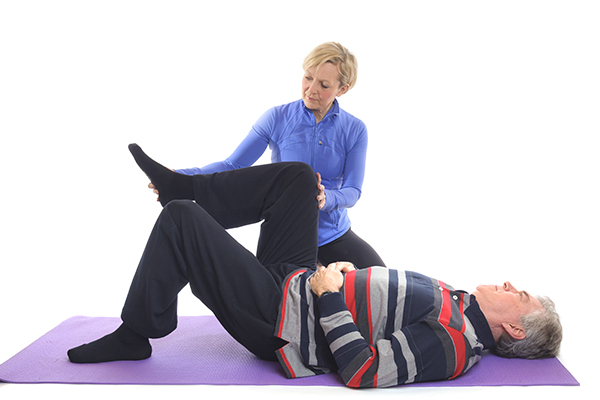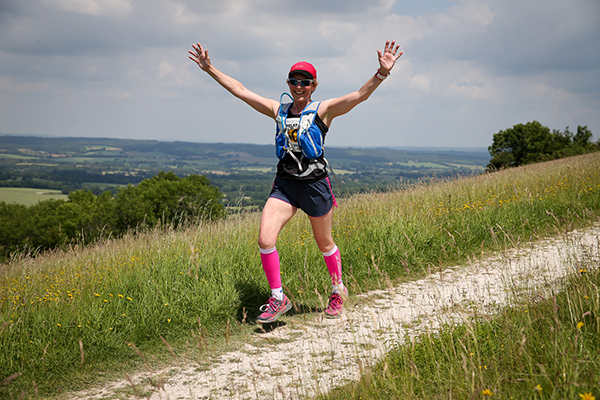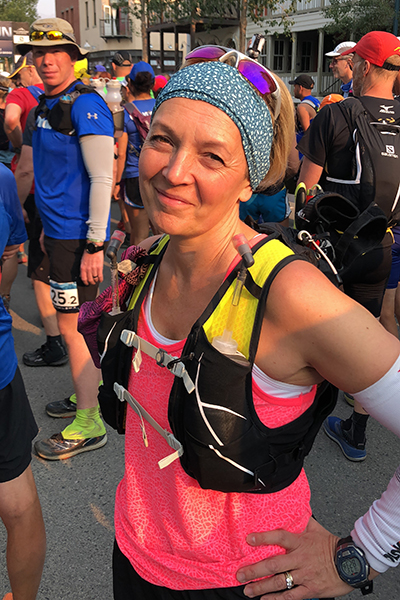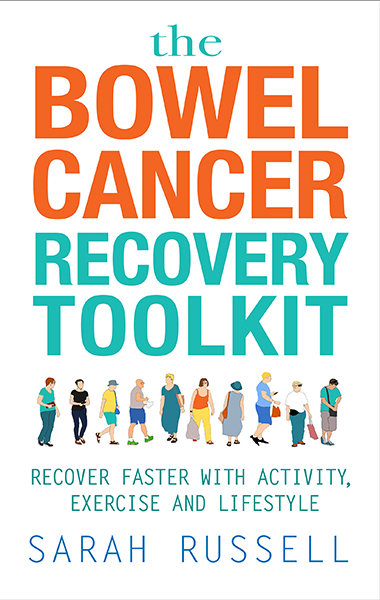Bowel cancer (also known as colon or colorectal cancer) is the third most common cancer in the UK today with around 42,000 new cases in 2015.1 Since then, numbers have kept on going up. Treatment usually involves surgery, chemotherapy and radiotherapy, or a combination of all three. In most cases surgery is a major procedure, often resulting in a stoma or colostomy bag. You may even have two or more major surgeries, and when combined with chemotherapy and radiotherapy, the whole treatment process can be long drawn out and challenging.
As an exercise professional, I’m deeply passionate about physical activity and the role it can play in recovery after illness and surgery. I’ve witnessed at first hand, time and time again, how rehabilitation and exercise therapy can completely change the course of recovery and long-term outcomes in people with bowel cancer, helping them to rebuild confidence and enabling them to lead a life of acceptance, movement and health, rather than one of fear and inactivity.

After surgery, Sarah was able to join her family mountain biking near Mont Blanc
We all know that being active is good for our health. Moving more, sitting less and being physically active are known to reduce the risk of heart disease, stroke, diabetes, cancer and many other chronic conditions. But when it comes to bowel cancer, exercise could well be one of the most powerful tools in your armoury.
Experts in exercise oncology are calling for physical activity to be seen as the fourth treatment option for bowel cancer, and for it to be included as standard in the care package for anyone with the disease.2
And there is a growing body of scientific research to back up this bold claim. Being active will help you overcome many of the debilitating side-effects from chemotherapy and radiotherapy, such as fatigue, muscle loss and weakness. It can help your body tolerate the treatments better and there is emerging evidence that exercise may help your body fight the cancer cells. Some studies show that being active after a diagnosis of colorectal cancer can improve your chance of survival by around 20–30%.3

As a clinical exercise specialist, Sarah draws on her own experience of bowel surgery and many years of working with cancer patients
But above all, being active gives you a sense of wellbeing and control and boosts your psychological health. It helps you feel that you’re doing something for yourself. And it just makes you feel better.
Yet I also know that exercise is one of the most difficult things to do when you have bowel cancer.
Despite the research, the messages from medical professionals about exercise are mixed and contradictory. There is very little practical encouragement to be active, and not much in the way of supervised exercise classes or groups. The ‘rest is best’ message is unfortunately very pervasive in society, so people aren’t getting the encouragement they need. If the doctor says to rest, then that’s what you’ll do.
Some research (awaiting publication) I did in 2018 (on behalf of medical devices company ConvaTec.co.uk) found that 90% of people who had bowel cancer said they didn’t do enough exercise for good health, as recommended by the World Health Organization (150 minutes of moderate activity per week).

Exercise has many emotional, as well as physical, benefits
To be fair, the vast majority of the population aren’t active enough for good health, so it’s no wonder when you have a cancer diagnosis it becomes even more difficult.
But it’s still a terrifying statistic. If you’re not meeting guidelines for exercise, you increase your risk of other co-morbidities—diabetes, heart disease, depression, arthritis etc—and fall into a vicious circle of inactivity and worsening quality of life. And we know that around 70% of people with cancer have at least one other chronic condition.
We need to reverse this trend. And fast! And that’s the reason for this book.
Patients with bowel cancer need to get moving and feel confident around exercise; they need not to be scared of exercise or allow the barriers they face to prevent them being active.

Sarah ran the Himalayan 100 Mile Stage Race with an ileostomy
But it’s hard to know where to start, or what’s safe. What sort of exercises should you do after surgery? Can you exercise with a stoma? How much exercise can you do when you’re having chemo? What if you just don’t feel like it? And how are you meant to get active when you feel exhausted and sick?
This book will help to answer all these questions and more.
It will help you navigate the confusing messages about exercise, how to overcome the barriers and how to feel more positive and motivated, even if you’ve never been active in the past.
You might be sceptical, uninterested or just too unwell to think about exercise. Don’t dismiss it just yet. All I ask is you have a read of this book and give it a chance. It may require a shift in your mindset but try to think about what you can do rather than what you can’t.

Surgery need not be the end of an active and adventurous life
Here’s a 10-point guide to how this book can help people with bowel cancer:
Reason #1
First things first. It is completely safe to be active when you have bowel cancer. In fact, not only is it safe, but it should be viewed as part of your treatment and recovery plan. Some studies have shown that by being active after diagnosis, you can reduce the risk of recurrence of colon cancer by around 20–30%.3 Chapter 1 shows that physical exercise can easily be built into your everyday life and does not have to include athletic or sporting activities if these are not your thing. You don’t have to go to the gym to exercise. Being ‘active’ really means just sitting less and moving more. It doesn’t have to be hard and it definitely does not have to hurt. Exercise needs to nourish you, not punish you.
Reason #2
Although you may not feel much like it, being active when you’re having chemotherapy and radiotherapy can help to combat some of the side-effects and long-term consequences of treatment, such as muscle loss, weakness and fatigue. Chapter 2 describes the effects of different types of cancer treatment on the body and shows that even short 10-minute walks will make a huge difference. Little and often is best.
Reason #3
Even if you have advanced cancer, bone metastases or a complex condition, it’s still okay for you to be active. As Chapter 3 shows, there may be some sensible adaptations you need to make, or you may need to work under the supervision of an exercise specialist or physio, but some sort of movement is one of the best things you can do to help you cope with cancer treatments and for quality of life.
Reason #4
After all abdominal surgery, and particularly if you have a stoma, you absolutely must do core/abdominal rehab exercises. Chapter 4 explains how to start them within a few days after your operation. It’s essential to strengthen these muscles and restore the function of your core. Even though some doctors and nurses are cautious, clinical nursing guidelines4 advise that it’s safe to start 3–4 days after stoma surgery with appropriate exercises, and these are carefully explained to get you started.
Reason #5
It might seem counterintuitive, but exercise is a great way to overcome cancer-related/ chemotherapy fatigue. As Chapter 5 explains, studies show that doing some gentle exercise (short walks to start with) can actually help you feel more energised and reduce your feelings of fatigue. Try it and see how you feel.

See Sarah on BBC Sport
Reason #6
The mental and psychological effects of exercise are immeasurable and incredibly powerful. Using movement as a way to recover after surgery and treatment will help you to rebuild your body, confidence, self-esteem and energy levels. In fact, I think the mental aspect of exercise is the most important of all, giving you a sense of control and positivity. Chapter 6 gives you an insight into how much exercise to do to facilitate your recovery, so that you don’t over-do it and become demoralised, and lose out on the mental uplift exercise can give you.
Reason #7
Rest is not best for anyone, even when you have bowel cancer. By resting too much, you risk becoming even weaker and deconditioning even more ... and falling into the inactivity/fear avoidance/loss of confidence spiral. Specifically, as Chapter 7 shows, after surgery you do not need to ‘rest’ for 6–12 weeks; instead, you should gradually start to become more active, walking more and beginning to do core exercises. Each exercise is carefully explained and illustrated to help you get started.
Reason #8
You can continue to exercise throughout treatment if you feel well enough. Chapter 8 gives a wide range of more advanced exercises you can try. You may need to adapt your training level or certain exercises for a while, but if you feel well there is no reason why you shouldn’t increase your exercise routine if you want to. You just have to listen to your body.
Reason #9
Eating well and being active go hand in hand. To enable you to be physically active you need to nourish your body with the right food and fluids. After bowel surgery your diet may change, and you may feel you can’t eat healthily or that your diet is restricted in some way. Chapter 9 covers the challenging topic of how to eat healthily after bowel surgery and offers some tips on making small changes to the food you eat to boost your recovery and long-term health.
Reason #10
Finally, Chapter 10 addresses the mind barriers that cancer patients often face when contemplating exercise. You don’t have to feel 100% well to exercise. It’s okay to start feeling tired or even quite unwell. Just moving a bit, going for a walk, doing some gentle stretches or something like yoga can actually help you feel better. You may have to push yourself to get started, but once you’re going, you’ll realise your body can do more than you thought.
But I also know it’s not that easy. The overall aim of this book is to provide a kind, gentle and understanding approach. To be empathic and encouraging, not judgemental. I simply want you to find out how exercise and proper nutrition can have a huge role in helping you feel better, rebuild your confidence and take control of your health, at a time when you feel most vulnerable.
There is a huge gap in patient care after bowel surgery. If you have a heart attack or have heart surgery, you usually get cardiac rehab. After a knee or hip replacement there’s often physio and group rehab classes. And if you have a lung condition, you can benefit from pulmonary rehab exercise classes. But what if you have bowel cancer or a stoma? At the moment, there is very little support, knowledge or advice. I know that because as well as it being my own experience, I’ve surveyed thousands of patients with stomas and bowel cancer and the vast majority were never given any advice about exercise or rehabilitation. Too often people are told what they can’t do, and there’s very little support to tell them what they can do.
So, I hope this book goes some way to plugging that gap—providing you with some expert knowledge about safe exercise and specific core muscle rehabilitation, how to get moving again, how to eat well, and most importantly of all, how to rebuild your confidence.
You might also like to share the book with friends and family, so they can support and encourage you too.
Good luck, and remember, when it comes to exercise, something is always possible, and something is always better than nothing.
The Bowel Cancer Recovery Toolkit: Recover faster with activity, exercise and lifestyle
Author: Sarah Russell
Publication date: 5 November 2019
Publisher: Hammersmith Press
ISBN: 9781781611364
Format: Paperback
Number of pages: 232

Sarah Russell is a clinical exercise specialist based in the UK


